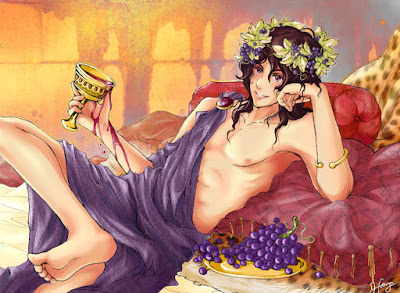 |
| Dionysus |
Jealous Hera hated his mother, the beautiful princess Semele, and one day when Zeus was away, the goddess disguised herself as an old crone and went to visit her. She talked about this and about that, pretending to be very friendly, and then she asked why Semele's husband was not at home, and what kind of man he might be.
"He is nobody less than mighty Zeus," Semele said proudly. "How can you be so sure about that?" said the old woman. "I know many husbands who claim to be the lord of all creation. Do you have proof that he really is who he says he is? If I were you, I would ask him to show himself in all his splendor." Then she went away, and Semele was left alone, wondering.
When Zeus returned, Semele asked him to grant her a wish. Zeus, who loved her dearly, swore by the river Styx to fulfill any wish she might have.
"Then show yourself in all your splendor," said Semele. Zeus begged her to change her wish, for he knew that no mortal eyes could bear the sight of him when he revealed himself as the flashing thunder-god, a hundred times brighter than the sun. But Hera had planted the seed of suspicion so deep in Semele's heart that she refused to change her wish. Zeus had to keep his promise, for he had sworn by the river Styx, the most solemn oath of the gods.
He joined together the smallest storm clouds he could find, chose his tiniest lightning bolt, and showed himself to Semele as the mighty thunder-god. Even so, he was so brilliant that Semele caught fire and burned to cinders. Zeus could do nothing to save her. She went down to Hades as a fluttering ghost. Zeus barely managed to rescue her unborn son, and sewed him under the skin of his own leg, and when the child was ready to be born, he sprang forth as the immortal god Dionysus. Zeus knew well enough who was the cause of Semele's death, and he gave her little son to Hermes and told him to hide the boy from Hera. Hermes carried Dionysus to the faraway valley of Nysa, and left him in the care of a band of Maenads, the nymphs of the valley. There Dionysus grew up with tigers and leopards for playmates.
Large bunches of purple grapes grew on the sunny slope of the valley of Nysa, and in time Dionysus invented the making of wine from their juice. As a young and beautiful god, dressed in flowing robes of royal purple, he went out into the world to teach men how to make wine. The Maenads went with him, and so did the leopards and tigers, and ever more followers joined him. Wherever he went he was worshiped as a new god, and his father, Zeus, watched him with pleasure.
Dionysus returned to Greece and traveled from island to island teaching the making of wine. One day as he was sleeping alone on a beach, a pirate ship sailed by. When the pirates saw the richly clad youth, they thought he was a prince and carried him off on their ship to hold him for ransom. He did not wake from his heavy slumber till the ship was far out at sea. With gentle words he tried to persuade the pirates to take him back; he was not a prince, he said, he was the god of wine, and his riches were not of this world. The pirates laughed scornfully and sailed on, paying him no heed.
Suddenly their laughter died, for out of the sea sprouted vines loaded with grapes. They grew, twining around the oars, winding up the mast, and spreading over the whole ship as though it were an arbor. Blood-red wine dripped down the sail and the air was filled with the sound of roaring tigers and braying asses.
Dionysus himself seemed to grow till he filled the ship with his glory. Horrified, the sailors threw themselves into the sea, but they did not drown, for Dionysus was a kind god. He changed them into dolphins, and that is why dolphins are the most human of all creatures that live in the ocean.
Dionysus had brought much joy to mankind, and Zeus decided that the time had come to give him a golden throne on Olympus. Hera rose in anger and said she refused to share the hall with the son of a mortal woman, but Zeus pounded his indomitable fist and Hera sat silent.
There were only twelve thrones in the hall, so kind Hestia quietly rose from hers and said that Dionysus could have it. Her place was at the hearth, she said; she needed no throne.
Before seating himself on his throne Dionysus asked to see his mother for whom he had always longed. Zeus not only permitted him to see her, but let him go down to Hades and bring her up to the glory of Olympus, or she was now the mother of one of the great gods. Happily Dionysus entered the hall and seated himself on his golden throne. The air was filled with the music of flutes and tambourines. Never had there been such a merriment on Olympus. Zeus looked around with great content beckoned to his cupbearer, Ganymede, bidding him fill the golden goblets with sweet nectar.


Comments
Post a Comment